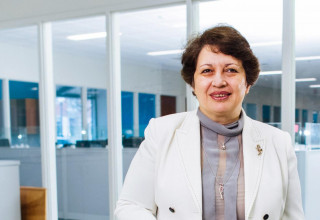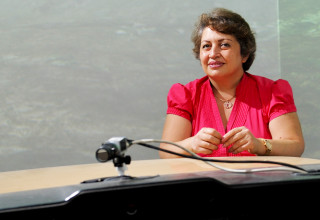
University of Illinois
URBANA, Ill. - April 26, 2022 - (Newswire.com)
Thanks to a $6M NASA grant, University of Illinois Urbana-Champaign mechanical science and engineering professor Naira Hovakimyan leads the way toward making flying taxi cabs a reality.
Part of NASA's University Leadership Initiative (ULI), Hovakimyan's project establishes the Center for Autonomous Vehicles in Air Transportation Engineering (AVIATE) at UIUC.
Hovakimyan, who is also serving as the new center's director, said, "The primary goal for air taxis is, once the infrastructure is there and the vehicles are there to operate, you should be able to live in Urbana-Champaign in your affordable house, work in Ohio, and have your dinner in Chicago."
Hovakimyan's L1 adaptive flight control system, currently used to provide maneuverability and safety in airplanes, is the key to making small autonomous aircraft a trustworthy mode of transportation and may be used to sidestep many of the challenges faced by self-driving cars.
"It [small autonomous aircraft] can come sooner than a self-driving car on the road. On the road, you have pedestrians, other vehicles, and much more unpredictability," she added.
In addition to UIUC, other team members include researchers from MIT, Georgia Tech, North Carolina A&T and University of Nevada at Reno. Lockheed Martin and Sierra Nevada Corporation are also involved on the corporate side. The advisory board includes Boeing, Google Wing and Kitty Hawk.
Flying cars have long captured the imagination of Earth-bound humans, and now researchers seek to make this notion a reality sooner than expected, resulting in many practical benefits and more mind-blowing aspects.
About The Grainger College of Engineering
The Grainger College of Engineering at the University of Illinois Urbana-Champaign is one of the world's top-ranked engineering institutions, and a globally recognized leader in engineering education, research and public engagement. With a diverse, tight-knit community of faculty, students and alumni, Grainger Engineering sets the standard for excellence in engineering, driving innovation in the economy and bringing revolutionary ideas to the world. Through robust research and discovery, Grainger Engineers are changing our world and making advances once only dreamed about, including the MRI, LED, ILIAC, Mosaic, YouTube, flexible electronics, electric machinery, miniature batteries, imaging the black hole and flight on Mars. And they are building a better, cooler, safer tomorrow.
About Illinois Mechanical Science and Engineering
The Department of Mechanical Science and Engineering (MechSE) offers top-ranked degree programs in engineering mechanics, mechanical engineering, and theoretical and applied mechanics. Engineering is evolving from an empirical discipline to one that uses first principles to understand physical phenomena spanning multiple length and time scales. MechSE integrates basic sciences and engineering to address the critical societal needs of today and to identify and respond to emerging needs and issues. Our faculty's research is impacting energy, the environment, health, manufacturing, security and defense, and transportation.
Media Source:
Naira Hovakimyan
Professor
Department of Mechanical Science and Engineering
The Grainger College of Engineering | University of Illinois Urbana-Champaign
nhovakim@illinois.edu
217-244-1672
Media Contact:
Chelsea Hamilton
Associate Director of Communications
The Grainger College of Engineering | University of Illinois Urbana-Champaign
clhamil@illinois.edu
217-333-1474
Related Images

University of Illinois

University of Illinois
Press Release Service by Newswire.com
Original Source: Flying Taxi Cabs in the Near Future? UIUC Researchers Say, 'Heads Up, Everybody'